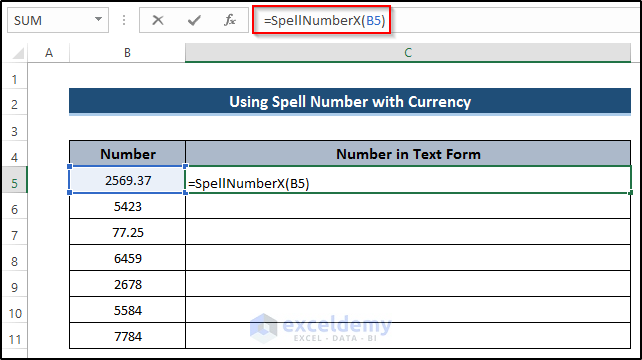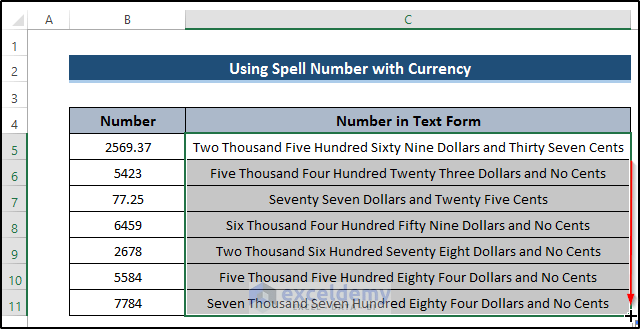Unlocking Text Conversions in Excel Introduction to Spelling Numbers with VBA
Excel is a powerful tool, but sometimes you need to represent numerical values as text. This guide will walk you through creating a custom function using VBA (Visual Basic for Applications) to spell numbers, including currency amounts, directly within your Excel spreadsheets.
Whether you're creating financial reports, invoices, or simply want a more readable format for your data, this technique will be invaluable. We'll cover two main methods: one for spelling numbers with currency and another for general number-to-text conversion, along with detailed code explanations and practical examples.
Currency Method 1: Spelling Numbers with
This method uses VBA code to create a function that converts a numerical value in a cell to its textual representation with currency. This is particularly useful for financial applications, such as creating invoices or summarizing financial data.
Follow these steps to implement the function:
1. Open the VBA Editor: Go to the Developer tab in Excel, click 'Visual Basic,' or use the shortcut Alt + F11.
2. Insert a Module: In the VBA editor, go to Insert > Module. This will open a new code window.
3. Paste the Code: Insert the provided VBA code into the module. (Note: The original content provides the necessary code examples, which would be placed here)
4. Close the VBA Editor.
5. Use the Function: In your Excel sheet, enter the following formula in the cell where you want to display the spelled-out number: =SpellNumberCurrency(A1, "USD") (replace A1 with the cell containing the number, and "USD" with the desired currency symbol).
Currency-Specific Examples: The provided code examples within the original content demonstrate formulas and techniques for Dollars, Euros, Australian Dollars, and Canadian Dollars.
VBA Code Explanation: (A summarized explanation of the VBA code should go here, mirroring the original content's explanation but in a more concise and user-friendly manner.)
Currency-Free Method 2: Spelling Numbers Without Currency
This method shows how to convert numbers to words without a currency symbol, which is useful for general number-to-text conversions. Follow similar steps to create this function:
1. Open the VBA Editor: Go to the Developer tab in Excel, click 'Visual Basic,' or use the shortcut Alt + F11.
2. Insert a Module: In the VBA editor, go to Insert > Module. This will open a new code window.
3. Paste the Code: Insert the provided VBA code into the module. (Note: The original content provides the necessary code examples, which would be placed here).
4. Close the VBA Editor.
5. Use the Function: In your Excel sheet, use the formula: =SpellNumber(A1) (replace A1 with the cell containing the number).
VBA Code Explanation: (A summarized explanation of the VBA code should go here, mirroring the original content's explanation but in a more concise and user-friendly manner.)
“Unlock the power of VBA to transform your Excel data into clear, concise, and user-friendly formats.
Excel Expert
Interactive Elements
Enhance Your Learning Experience
Download Practice Workbook
Get the Excel file containing the VBA code examples and practice data. Experiment and refine your skills.
VBA Code Snippet
Access the direct VBA code for each method in an easy-to-copy format.
Further Learning Related Articles and Exercises
For more advanced Excel techniques and practice exercises, check out these resources:
- [Link to related article on how to spell numbers in Rupees in Excel]
- [Link to related article on how to spell numbers in Dirhams in Excel]
- [Link to related article on how to Convert Peso Number to Words in Excel]
- [Link to related article on How to Convert Number to Words in Excel]
- [Link to related article on Convert Number to Words in Excel Without VBA]
- [Link to Free Advanced Excel Exercises]
Mastering these concepts can greatly improve your Excel efficiency and data presentation skills.